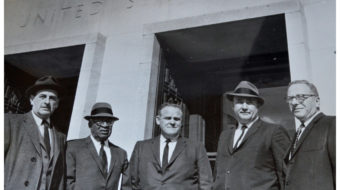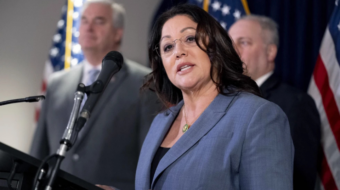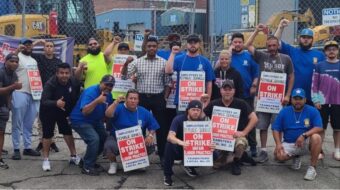READING, Pa. – When Steelworker Vonie Long of Coatsville, Pa., wants to send his area’s two GOP congressmen a message about the harm so-called “free trade” pacts do to workers, he points to Reading – specifically to the vacant lots where homes used to stand and the weed-overgrown parking areas of shuttered factories.
That’s the past impact of trade treaties, he tells Reps. Joe Pitts and Jim Gerlach.
Whether that message from Long, a member of Steelworkers Local 1165, fellow Pennsylvania Steelworker Bill Herbert of Local 5652, or Edison Fraser of Machinists Local Lodge 846 in Baltimore and Larry Young of Machinists District Lodge 74 in Norfolk, Va., will get through to their representatives will be tested this month.
That’s because the four workers, and hundreds of other unionists, fanned out on Capitol Hill Oct. 4 to lobby lawmakers against so-called U.S. “free trade” pacts with South Korea, Panama and Colombia. And tens of thousands of other union members are jamming phone lines and sending e-mails to Congress, protesting the pacts.
Unions, led by Steelworkers President Leo Gerard and Machinists President Tom Buffenbarger, launched their ultimate effort against the pacts after Democratic President Barack Obama sent legislation implementing them to Capitol Hill the day before. The pacts themselves will not come up this month, but those laws will.
Under existing legislative procedures, proposed trade laws can’t be changed but can only be voted up or down. The pacts and the legislation lack worker rights in their texts. They also do little to protect U.S. workers against foreign imports, Gerard and Buffenbarger told a sun-splashed press conference before lobbying began Oct. 4.
“Almost 20 years ago, we stood on this spot to urge Congress to stop NAFTA,” the job-destroying U.S.-Canada-Mexico “free trade” pact that’s the model for the Korean, Colombian, and Panamanian pacts, Buffenbarger said. “We warned it would ruin communities and drive the nation’s economy into the abyss – and look what happened.”
But lawmakers then “listened to the Alice in Wonderland tales of the CEOs” promising jobs and trade surpluses, and passed NAFTA, he said. Now, they’re poised to repeat that performance, unless labor stops them.
It has good reason to do so, Gerard added, and not just because the Korean pact alone would cost 159,000 U.S. workers their jobs. The Panama pact would reward a nation that’s a haven for tax evasion, and Colombia has had more assassinations of unionists campaigning for their rights – a total approaching 2,600 over the last 25 years – than the rest of the world combined, he said.
“If 51 CEOs were murdered in Colombia last year” – the number of unionists killed – “do you think we’d be discussing this pact today?” Gerard asked. Another 22 have been murdered so far this year. “I’m an organizer and if I go to Colombia, I could be killed,” adds Baltimore’s Fraser, who’s also his lodge’s president.
“I’d tell” Missouri GOP Sen. Roy Blunt “to ‘open up your eyes,'” says Bill Rudy of IAM District Lodge 142 in Kansas City. “Leo said it’s hard to understand how trade unionists can be murdered” in Colombia “and the government there can stand idly by.”
Still, the unionists face uphill odds in battling against the three trade pacts and the implementing legislation. The GOP is solidly behind them and Obama, echoing the corporate line that exports under the pacts create jobs, pushes them, too. Some Democrats support the pacts as well. A move to insert labor rights in the Colombian bill lost 24-12 in the GOP-run House Ways and Means Committee on Oct. 5.
Obama, the GOP, and business are a powerful combination to oppose. Unionists have another explanation for why they face such odds, despite the job destruction of NAFTA and the jobs-destroying forecast of the Korean pact and the others: Money.
“If you look at their PAC (campaign finance) dollars – from Monsanto, American Airlines and others – it’s called special interests,” Rudy said; Herbert agreed.
“U.S. corporations are taking our jobs here, and going there to maximize their profits,” Herbert added. “And then they put people out of work here and wonder why we have economic destruction?”










